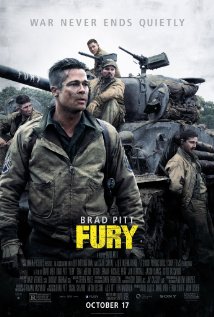
FURY
US, 2014, 134 minutes, Colour.
Brad Pitt, Shia Laboeuf, Logan Lerman, Michael Pena, Jon Bernthal.
Directed by David Ayer.
It is surprising to find a World War II film, with such a big budget 70 years after the events portrayed. After all, Brad Pitt’s previous film was the futuristic zombie film, World War Z. In many ways, Fury is a strong reminder of so many of the films of the past, the events of the American troops moving forward into Germany in the last months of the war.
In fact, Fury is the name written on the gun of an American tank. We focus on the tank and its five-man team. There a number of smaller roles in group military scenes as well as in the town occupied by the Allies but the main focus is on the group of five. Brad Pitt is the commander, strong-minded, tough, with a knowledge of German, and an ability to read his men and control them. Shia LaBoeuf? is a tough young man and a continual Bible reader, able to quote Isaiah chapter 6 and God calling the prophet into action. Michael Pena is Hispanic. And Jon Bernthal is a grizzled veteran, aggressive, sometimes obnoxious, but with a deep-down heart.
The other member of the group has been killed and they are sent a very young man, played by Logan Lerman, as the replacement driver.
One of the themes is the father-figure, mentor role played by Brad Pitt in helping the young man to adjust to the war situation after being only eight weeks in the army. Norman does not want to kill, lets a young German survive, to the anger of the other members of the group. In many ways, the film is the story of the blooding of Norman, his being transformed into a fighter and a killer.
There is also another theme for Norman. When the Allies capture and occupy a town, the commander sets himself up in a house, a reluctant woman allowing them in. Quite a lengthy part of the film is taken up with quiet time, a meal, cleaning up in the house. Pitt suggests that Norman and the young woman in the house go into the bedroom, a sexual initiation. This also has an emotional effect when the house and the town are bombed.
In the latter part of the film, Pitt’s tank is the only one to survive an onslaught. Soon they encounter several hundred German soldiers on the march and decide that they will stand their ground. While they cause a lot of destruction and death, it is finally a moment of self-sacrifice. Some commentators have found that the last 10 minutes undermine the previous part of the film – this review disagrees because the experience of Norman parallels his previous encounter with the young German soldier.
The re-creation of war, the military, the town occupied and bombed, the final stands are meticulously recreated. The effects and action are impressive. However, one needs to be in the mood to watch such a grim film and to reflect on the issues it raises about war and men in war.
1. World War II? Audience knowledge of the war? Feelings about the wall? Sense of history? Perspective?
2. The title, its implications, in the context of war? The word inscribed on the cannon on the tank? The word glimpsed throughout the film?
3. Germany, World War II, the history of the war, American participation? 1945, spring, the final month of the war? The snow, the fields, the towns, the town squares, homes and interiors? The tanks, their equipment?
4. The action, the stunts, the special effects, the score?
5. The cast, Brad Pitt and his status, the other members of the cast, the images, American?
6. The tanks, their role in warfare, the teams, the leader and the influence, the driver, the gunners, all working together? American tanks? German tanks?
7. Brad Pitt as the leader, his age and experience, knowledge of German, tough decisions? The other members of the team, Gordo and his Hispanic background, Bible and his reading of the Bible quoting it and Isaiah 6, Coon-Ass? and his tough stances? Taunting Norman? The death of the other member? The arrival of Norman?
8. Norman, his age, eight weeks in the military, lack of experience, arriving, the team’s reactions? Young and shy? His letting the German live – and the repercussions for him at the end of the film? In the tank, in action? With the leader, the bonds, the father-figure? In the town, with the mother and her daughter, the quiet experience, looking at the girl, the leader advising them to go to the bedroom, the response of the girl, consensual or violation? The effect on him? Being a man? The bombing of the town, the home, the death of the girl? His work in the tank, on the lookout, seeing the squad of Germans? The shooting, the destruction, the crossroads? The battle, and his being left alive?
9. The town, the American occupation, the reaction of the men, the leader and Norman in the house, the meal, the woman cooking, her fears, the young girl, the sexual situation, her death?
10. The battle at the crossroads, each of the group giving their all, the leader, his death? Norman as the sole survivor?
11. The film 70 years after the events, re-creating them, exploring their meaning and the meaning of war?